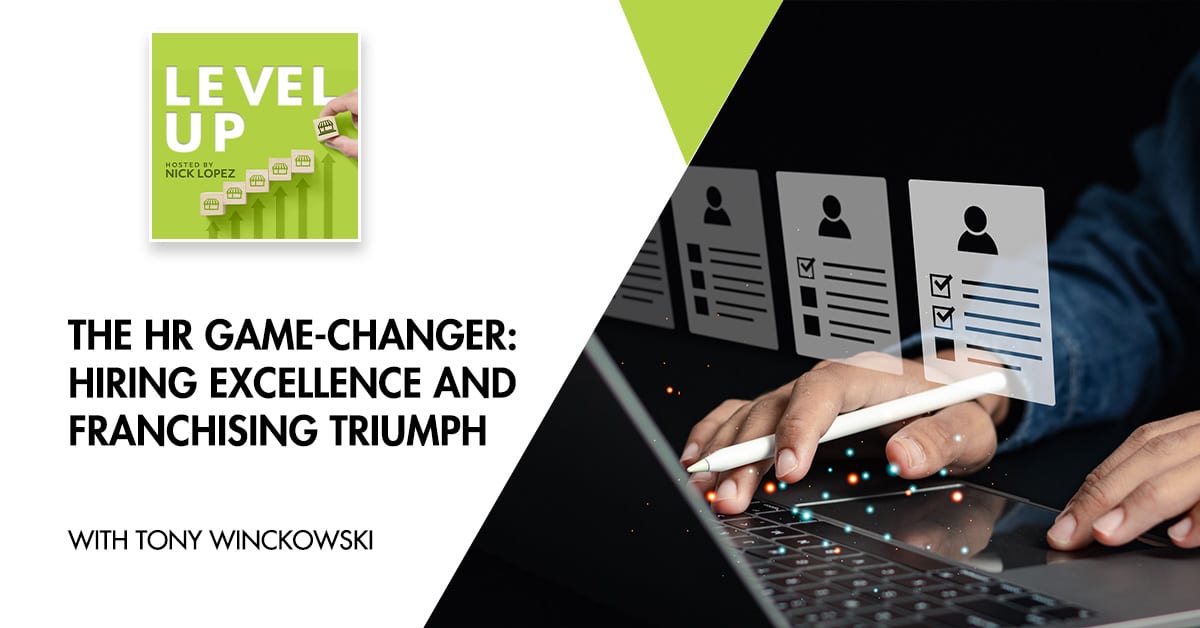
To master the art of franchising success, you must first unlock the potential of human capital. In this week’s episode of The Level Up Show, get ready for an enlightening conversation as we sit down with Tony Winckowski, the Vice President of Sales, Enterprise HR Outsourcing, Strategic Partnerships at Zynergia. Join us on a journey into the dynamic world of HR and franchising that promises to be a game-changer for your business perspective. Tony shares his personal HR odyssey, shedding light on the pivotal role of human capital in the triumph of franchising ventures. Discover the secrets to hiring top-notch talent and why investing in the right people is a strategic masterstroke. Tony also discusses the intricate dance between organizational culture and strategy, uncovering the indispensable role of HR in cultivating a thriving workplace ethos. By the end of this episode, you’ll emerge armed with invaluable insights and tools to excel in the realms of franchising and human resources. Don’t miss this must-watch opportunity to level up your knowledge and skills in these captivating fields. Tune in now and take your game to the next level.
—
Watch the episode here
Listen to the podcast here
The HR Game-Changer: Hiring Excellence And Franchising Triumph With Tony Winckowski
Insights And Best Practices For Hiring And Nurturing Talent In A Franchise Business Environment
We have a gentleman on the show who has decades of experience in HR outsourcing. He is the VP of Sales and strategic partnerships with an organization called Zynergia. Tony Winckowski, welcome to the show.
Thank you very much. I appreciate it. You have all the complicated names like my last name is correct. Thank you.
It’s a great last name. I was and am very excited to kick off the show, give some context to the audience, and help them level up around this whole concept of HR outsourcing. You are an expert over decades in the space. As we all know, business is all about the people. This man here, ladies and gentlemen, has built his career around helping small and midsize companies compete with the big boys, organizations that hire thousands of folks. HR outsourcing such important work to bring value to business owners much like myself, frankly. That’s why I’m excited for this conversation. I will nerd out plenty throughout.
Before we dive in, we are in this space of franchising, and most folks don’t necessarily have an idea that franchising is just about anything. If it’s legal, ethical, and makes money, it can be a franchise. Things like painting brands, ice cream shops, cookie stores, you name it. It can be franchised. It’s not just McDonald’s and Burger King and the like, which so many times that’s what everyday person thinks about franchising. Franchising has this interesting way of finding folks. You don’t necessarily lift your hands and say, “I’m going to get into franchising.” You have a very interesting story I’m interested to hear. How did franchising find you?
It is crazy that franchising did find me. I went to school to be a veterinarian. Weeded out chemistry, didn’t know what I was going to do. I was a blackjack dealer for a couple of years in Lake Tahoe. Excellent life. I had to go and do something else. I got into sales. I wasn’t a salesperson. I was the opposite of a salesperson when I first started. I eventually learned how to work with ball and midsize businesses. What I found that I enjoyed was the HR piece, the human resources people that make companies. I enjoyed the idea of the underdog and helping small and midsized businesses.
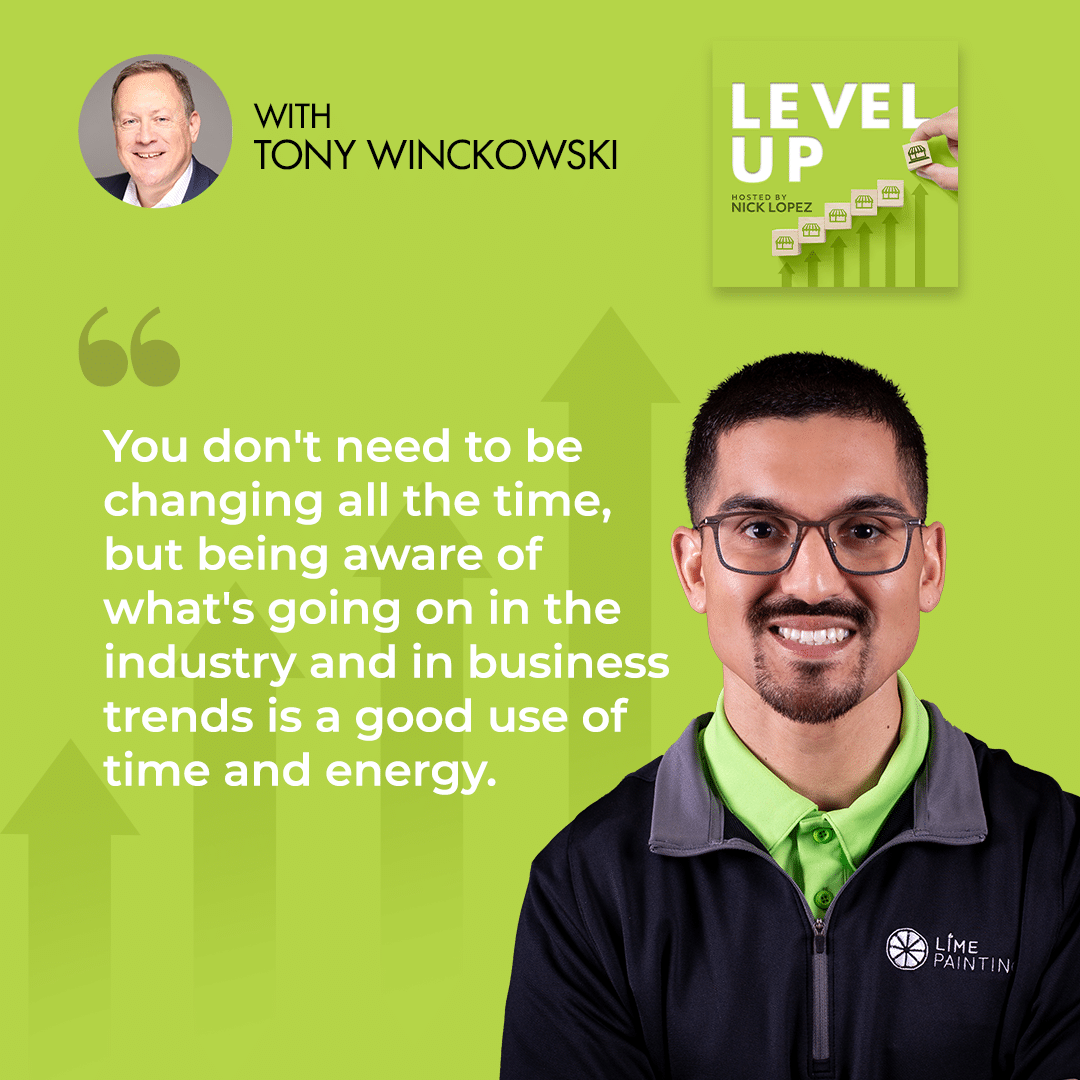
I ended up going into the route of HR business services, which then led to an HR outsourcing focus. In the sales arena, if you are passionate about what you do, you just do it better. You enjoy it and you are motivated to see the successful outcomes, and how you can help those small midsize businesses. At the time, I was working with Paychex and I had my first opportunity, franchising came to me. There were franchise owners who owned McDonald’s, Subway, or other brands. We would talk to them about their payroll. However, we never got into a situation where we could provide an option for a large group a franchisor, and the franchise system.
My first taste of that was with Paychex. We had a customer that franchised brands. I was asked to be a part of it. It was in my territory. I was a senior manager at the time, and I was asked to participate and just thoroughly enjoyed it. It was fun to see a brand coming to life. Learning about the model. The more that I learned about the franchise model, the more I got interested because I like doing systems. When you look at the franchise model, from my perspective, it’s a playbook that if you execute it and depending on how well you execute it, you can be successful.
That’s the hard part for a lot of folks who are entrepreneurial that want to go out there and put themselves on the line to be successful and to be an owner. That was my first time. I did that. It was a lot of fun. We had some success. The second time came around when I was with TriNet, and it was awesome to be asked again to lead up a national franchise team.
We worked from scratch and we put together a program that TriNet could offer, as well as I had a team that we worked with, and I had amazing people on that team. I was very fortunate that not only were we able to have the backing and the energy of the organization, but also the folks. This is where we dove into the franchise world.
This is where I found out that human capital, in my mind, is the key to success. I started learning that human capital is the key to success for most businesses. In the franchise world, with the joint employer doctrine, learning about that and seeing that come into play, you figure out that in the world of any business, if you think about a pie being a business plan, there is a sliver of this pie, depending on the industry and depending on the type of business that is made up of what is affluence by the employees. I call that human capital. It could be 10%, 30%, or 50%.
If you think about it, the franchisor provides this wonderful playbook from the business data point of view. The one piece that you can’t get into is the human capital. More so human capital is important for all businesses, but when you look at the franchise system franchisor and the franchisees, human capital becomes the key to success. Can you execute the franchise playbook that’s given by the franchisor to the best of its abilities?
In between, there is this underdog theme. I love when you mentioned that you root for the underdog. Throughout your career, you have appreciated this underdog mentality. What do you mean by that?
First off, I’m entrepreneurial if I work within an organization. I have an amazing ad admiration for entrepreneurs. To me, if you are an entrepreneur and you have the intestinal fortitude to lay it on the line and put it out there, you have my utmost respect. My thought has always been, “How can I support these folks to compete with them?” When I first started back in the day with Fortune 500 companies, they were Fortune 1000 companies. How can I help them be able to compete?
As you go into it, you start finding out there are a lot of opportunities for small and midsized businesses to take advantage of things that they just don’t know about. Most folks are experts at what they do but they may or may not be experts with businesses. In my mind, if I can help directly or indirectly bring those resources to them, that gives me a lot of personal pleasure, which is then what leads us as humans to do what we do.
It’s interesting in the franchise space. Specifically, in-home services you are building a national organization, it’s standardized, and yet your direct competition is mom-and-pop. All of a sudden, you are the big fish in the pond.
Without a doubt.
Just to hit on that piece and that’s specific for home improvement. It’s unique to home improvement.
The ability to take advantage of the resources that are available and having centers of influence that can help you do that is critical to success. Being able to create programs in place for you in that space to be able to find the best talent, develop them, and retain them, is going to increase your abilities to be successful.
Interestingly, franchising is the big fish in the pond when you have an unsophisticated mom-and-pop that traditionally hasn’t had solid processes. It’s so much of a very fragmented space that is being standardized at a pretty rapid rate. Human capital is a big part of getting ahead in that competitive advantage, especially when you start talking about owning and operating multiple territories. To your point, that’s where a lot of folks find a much success is being a multi-unit owner. You are going to need human capital to make that happen.
Sometimes the barrier to the success of a franchise or a franchisee is it’s not that the plan didn’t work. It wasn’t the location. It’s the idea that how do I duplicate myself? This is their first time even in business, and we have run into them in the outsourcing world. They are working harder now in their retirement as a franchise owner than they were at their day job in the previous years. Being an owner is already hard enough as it is, and if you don’t give yourself the best chance by having the best folks to execute the game plan, you have made it harder.
Let’s just assume that you are able to accomplish that. There are a lot of great leaders who when they are local and in their unit, they are fantastic. Now you get a second unit, now you have more time, it’s not necessarily double the amount of work. It could be even more than double the amount of work and double the headaches. You go 3, 4, and we all know that as you build more units, that’s how you are building that well-feature. You are trying that many of the franchisees, that’s their goal and objective. It becomes virtually impossible to have remote locations and be able to be as good unless you find somebody who can think, act, and be in step with you. That’s hard.
One of the things that you can do is understand what’s important for the types of employees that do best. What are they going to be doing? What are the skills that are necessary short term? If I’m going to be potentially expanding either my territory or adding more units, do I have people that I can take that are capable enough to then move into a leadership role and take on that responsibility? If they have been growing up underneath you and understand the program, you have done the perfect thing because that person goes over and then stamps this new unit identically to what they have grown up in and what they understand how to do. That’s the ideal case. For a lot of folks, they don’t have that.
Being able to have a game plan to understand what you need best, and understand the tools and techniques that help you find the best people. The world’s changed. It used to be, “Find a good people to come on board and you are off and running.” It’s not like that anymore. You need to make sure that if you don’t have a plan, having a basic plan is a great first step. If you have a basic plan, getting it more complex in this day and age is critical. It is amazing the amount of work that is needed once you hire somebody for that first year, which you need to do on the onboarding process even before they take step foot into your location.

There are so many things you need to do in order to keep that person and make sure that they stay and see not only what they thought they were coming into as an employee for you, but also to see the opportunities for the future. It has gotten demanding. I had a couple of articles come across my desk and found that 1 in 3 Americans have lied during the interview and onboarding process. 4 in 10 hiring managers have lied in the interview process.
I don’t think people set out to do that. What ends up happening is that they are stuck and they don’t have a solution. Being able to have solutions to help you as hiring managers correctly be in line with the leadership of your group to make sure that you are spelling out what that looks like, and then being confident in what you are providing your folks, that’s critical.
Being able to have tools to help fare it out. Folks that may or not be telling you the truth in all cases when it comes to what their abilities are, their background is very critical for success. The last thing you want to do is do everything right, except for maybe the ferreting out of that person’s abilities and background. Now you have somebody on board and it’s a lot more work to correct the situation or extricate yourself from that situation.
Often you hear simplicity scales. What you are saying is, that you need to be pretty sophisticated nowadays. It used to be a lot simpler retention, but retention has become a little bit more dynamic.
Without a doubt. Simplicity does scale. You are spot on with that. If you are framing the amount of work that we talked about and the complexity, I just was sharing it with you. Now, would you need that for one? It’s not. As you are expanding, it gets harder to be omnipresent. You need to have those tools. To me, having a system could be that simplicity we are talking about. Having that is critical. What has become dynamic is because the world we live in is making sure that maybe we grew up with when we started our working world and that onboarding isn’t necessarily what onboarding looks like now.
What retention used to look like. Pay a fair rate and offer some benefits that used to work but don’t necessarily work now. People can find that nowadays. What’s interesting about the world of virtual work and how we have an international society, you can find those opportunities. What people are looking for is something that will help them now with their goals, but they are also looking at the future.
As a franchise owner, as long as I’m aware that that’s a possibility or an outcome of my relationship with these people, that’s fair. Business practices are business practices, and you have to do what works for you and how you feel about it. You feel good about it, but you better be aware of what the potential outcomes are.
For a lot of folks I have talked with over the years, they want to bring on people and they want them to be with them for a long time. As we talk about the ideal cases, having that person come up underneath you, going out, and then managing one of your locations. You know you are in sync and you know your chances of success are greatly improved. What I was talking about with the dynamic piece of that is that what worked a few years ago may or may not work for you now. You don’t need to be changing all the time because who wants to do that in life? Being aware of what’s going on and what’s the trends is a very good use of time and energy.
A great process creates that simplicity. Speaking of which, you have a human capital playbook, there’s a basic and advanced component. Would you mind elaborating?
When you think about basic components, it’s just making sure that you are executing the basics, which is making sure you are hiring the best possible person. It’s not about just putting out a job description, but it’s understanding what is this role now and what this role is in the future. A basic component is having a hiring process. I have to put together a job description. I’m going to find my sources, the best chances of finding the people out there, so I’m going to source my people. That’s very basic and it’s very important.
However, as your needs, depending on your location, and the type of position you are looking for, it can get more advanced. The basics to me are simple things like, “Do you know what an A, B, or C candidate looks like for you?” When I talk to a lot of business owners, they don’t think in those terms. They didn’t understand that. As far as this role, what’s the importance of this role? Is this a critical role or not? What would you like to see?
Ideal case, if you hired somebody, what would that look like for that person in the future? Could you hire somebody by asking some different questions? Could you hire somebody who has leadership capabilities? That way not only could they do their initial role, their entry point into your organization, but then they could give you the flexibility and be an option to potentially move into a leadership role.
You have those basic components, having a benefit package that is going to attract the right folks for you, the right candidates. A lot of times people say, “I can’t afford the best top-of-the-line of everything.” That’s okay, you don’t need to because if you can’t afford it, you can’t afford it. Understanding if you do A, what’s B? If I have a benefits package and a compensation package that’s in the middle, then be aware of the type of folks that you are going to attract. You have to encompass that into your business plan. It doesn’t mean you can’t be successful, it just means that you might have more turnover in positions.
A lot of times, that’s why I go back to, “Do you have critical roles?” You probably don’t want turnover in those critical roles because that’s a lot harder to overcome those types of turnover. Basic things are like retention programs. What are you doing to make the person with the benefits and make sure the person feels good about the decision to work with you?
The complexity comes with, now, if the basics aren’t working, and I’m not getting where I need to be, what am I doing to do more? As things have gotten more difficult after the pandemic, we have folks who have people working virtually even in the franchise world, you might have key employees who are remote and are not working at a location. How do you handle that? It gets more complex.
Making sure that you do certain things very well at a basic level. The key sections in the process of the lifecycle of your employees, making sure you identify what are the key ones and being more complex, I think in those things. That’s what I mean by the difference between a basic playbook in a more complex playbook.
A process, and that’s going to simplify it, gives you objective best practices that you can just execute on. Trial and error, get better with, and fail forward with. There’s a best practices playbook. That creates the simplicity of just focusing on executing. Are personality tests at all involved in this?
It depends on the organization and the businesses I talk to. Some folks use personality tests, while others do not. It’s just like everything in life. In my experience, there are waves and for a while, there were a lot of personality tests going on. Sometimes there’s backlash from doing certain things or there are just changes.
Due to time, things have changed. Hiring instruments, whatever it is, you want to make sure that that instrument is legal, and whatever instrument you are going to use, be aware of the potential outcomes of using that. Is going to provide me exposure to something. If it provides you exposure to something that doesn’t necessarily mean it’s a bad decision, but are you prepared for that? Are you able to handle that?
What comes down to is making sure that for your business plan, the positions you are looking in, putting together a program, and bringing in an HR expert. Bringing them in and making sure that you do put together the program that’s going to make sense and give you the best chance is the key to success. Whatever tools, or processes you put in place, because we are all so busy, taking the time and energy to figure that out is critical for long-term success.
What are some instruments that are best practices?
In 2022, I was involved in putting together a training program, and providing it was a speaking opportunity as well. I did a lot of research because they wanted updated information. What I found, which was interesting, was that it wasn’t necessarily that there are specific instruments you should use or specific tools, like a brand name. What it was interesting to find out is that the onboarding process, which we have all been a part of at one point in our life, whether we ran it, has become critical to success.
It’s amazing how many people leave jobs in the first 30 days and the first 6 months. If you want to avoid that dilemma, make sure you are aware of that and put together a game plan to address that onboarding process. That’s a new thing I learned. It seems to be amazingly important when you look at the statistics that are out there.
The role is communicated one way up front. Onboarding is ensuring that that’s fulfilled on the other side. Appropriate training and support once a part of the team, is that what you are speaking around there? Training and just the quality of being set up for success.
It’s about the employee experience. As owners, we all like to say, “I’m giving an opportunity and I’m giving you a job and I’m paying you.” That’s fantastic. The world has changed. It doesn’t mean that’s a bad thought process and a bad business practice. If you can make it work, you make it work. If you want to go flow downstream with what the landscape is, the playing field for employees, it’s about the employee experience. You are attracting the best people, you are hiring them, and you are onboarding them. The onboarding isn’t one day of just a, “Here’s your computer. Here’s who you talked to about this.” No. The onboarding is helping affirm the decision that I made coming on board.
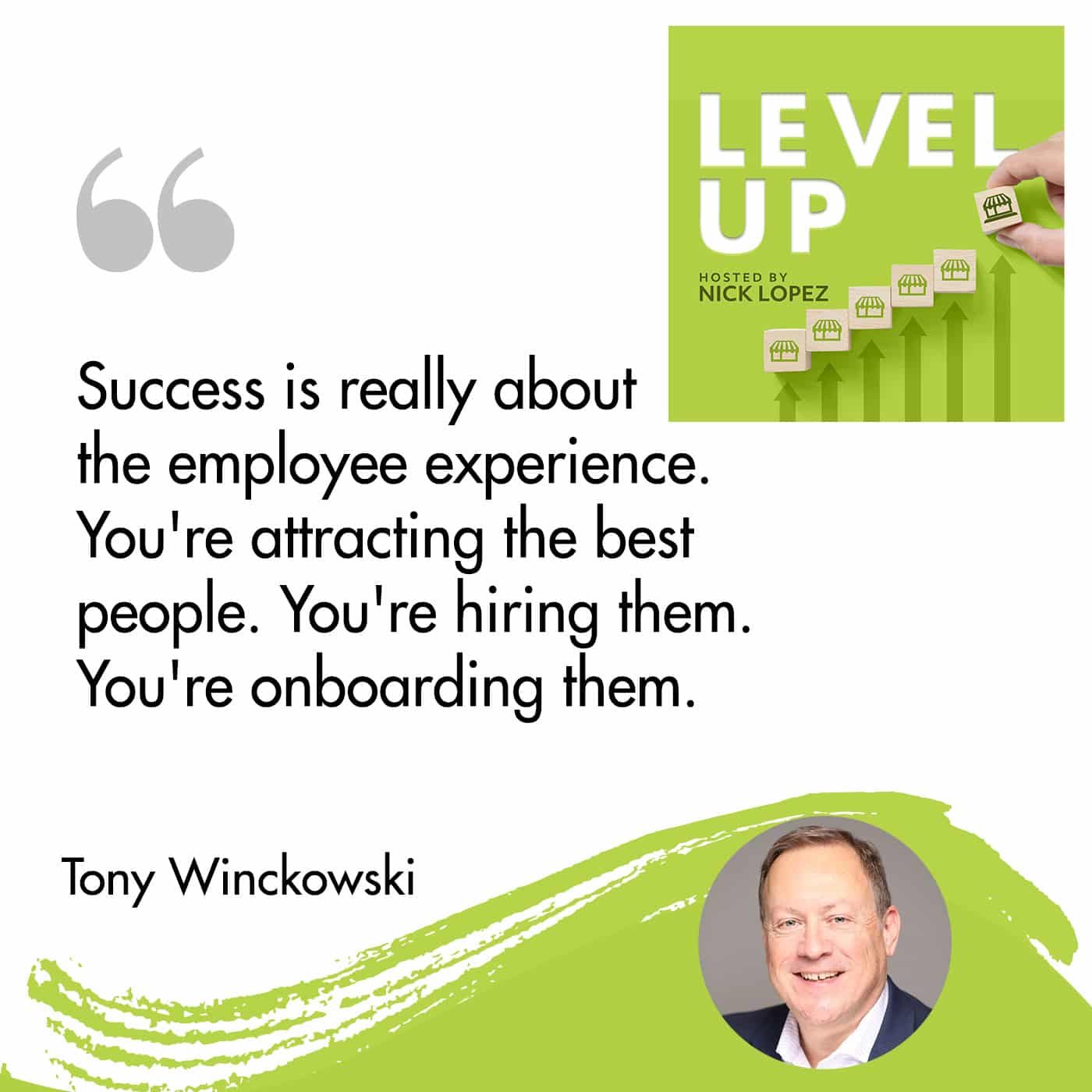
I have joined you and I’m on your team. This is your opportunity as the owner to make sure that you are affirming my decision. Many times that is left out of the equation. The reason why this has become important isn’t something that is naturally you think of. It’s because of what the studies show on exit interviews and third-party surveys of when people leave and why they leave. The crazy part about it is that we go back and you had mentioned this earlier, communication is so basic, but so critical and it’s so left out. It goes, “I’m so busy, I got these other things I got to do,” because they haven’t valued the communication.
This part of the puzzle is equal to making sure they know how to use a cash register or making sure they can go out to the side and properly communicate with a homeowner about what you are going to do. Make sure you treat that homeowner correctly and make them a positive experience that you are there, even when you leave, you take care of everything. It’s just because the value hasn’t been there. The value, it’s very obvious that the studies show that it is critical to make sure that you are taking time to communicate. Many times people leave and the manager doesn’t even know that they are not happy because they haven’t talked to them.
Or the person left because they thought they were doing a horrible job. It turns out they were doing a great job. The first time they heard about it was when they gave the notice. Now it’s usually too late because let’s face it, when somebody gives a notice that they are leaving you may be able to keep them on board, but it’s always going to be in the back of everyone’s mind that person had a foot out the door.
There are no black-and-white answers. This is a completely gray subject matter. There are levels to the situation. Being able to onboard them, affirm the decision, communicate with them, and let them have wins. Here’s a new thing that I have learned that I never even thought of. Sometimes we did it by accident or did it naturally just because I’m in a sales environment. In sales, you have, “Set this many appointments and we will celebrate it.” That’s pretty simple because that’s the nature of the job. A lot of businesses, don’t have that, they don’t have metrics or milestones that you could create early to engage that person to hit gold and then take the time to recognize that person.
When we talk about recognition, it doesn’t have to be a big gift, a fancy event, or something like that. A simple recognition that, “You had a goal in 30 days of your job and you hit it. Congratulations.” That goes so far. People feel appreciated. It is so critical because the times when people might get approached by another franchise competitor or another brand, maybe a completely different industry, and they don’t feel that they are loved and engaged with their company, then they have a better chance of taking a listen to what the opportunity is.
Sometimes, you know what you have and you are not 100% happy, sometimes you lose people and it’s not the right decision for them to leave. You as the owner still have no idea what the fallout of that is. I’d tell you, that onboarding, engaging, building strengths, and having purpose are critical. Training and development for the future. Make sure that this person may not be around in three years, but let’s minimize the chances of them leaving and let’s increase the chances of them staying. In three years, most likely, if you are doing a good job with them, they are going to be valued. Also, they are going to be moving on for a different reason, whether it’s their choice or your choice, but it will be for the right reasons. It’s just not a long-term fit for either party.
Culture kicks strategies butt all day and every day for this reason. This is a huge part of it. Culture creates some pretty powerful movements. That’s the beauty of the underdog. Why do you love franchising so much?
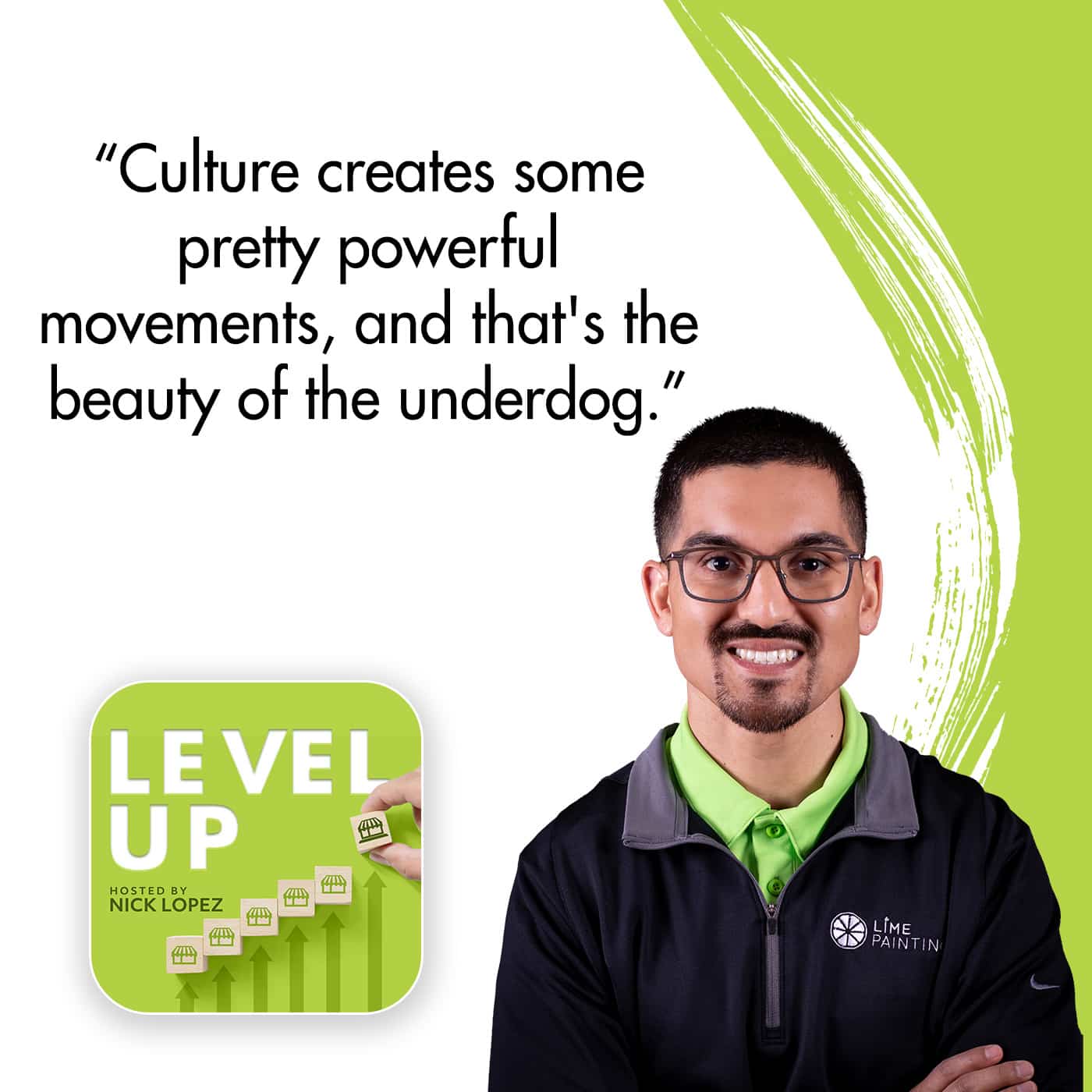
As I said, I love the idea of entrepreneurial spirit. The whole model allows folks to be able to investigate that and give it a shot if that’s what they want to do. From my business perspective, even as early in my career, I’m a big fan of that. I love the idea that there is a business plan that you can execute and if you do A then B will happen. That’s the great part about the franchise model.
What I also like about it from my perspective is that it allows what I do and what I have passion for, to play very well in this space because it’s that little extra that the human capital piece and being able to compete and helping these folks compete, I can come in and add value, immediate and long-term value with folks. I can’t do that in all the spaces out there.
There are other places I can do that in, but to me, that’s one of them that is a lot of fun. I also own an outside-the-box thinker. Anybody who knows me who’s tuning in right now would tell you, they will just laugh and go all the time outside the box. What I think was so cool about the industry is that the box is always expanding and changing. There are always new ideas coming out, new ways to do the same old idea, new industries.
Think about the pen industry, look how far it’s come just in the last decade or so. That’s exciting to me, and that’s why I like the space so much. The last thing about it is I’m very competitive. Most owners are competitive. When you think about the fact that it’s so hard to find the best possible talent because you just don’t have the tools and resources to do that.
I’m able to bring in either direct or indirect support to those owners and help them execute the human capital slice, whatever that is that will help them execute the franchise plan. It allows me to enjoy the space, enjoy the people, enjoy the stories, and enjoy the subject matters, different industries, and verticals, but then also be able to have an actual black-and-white, “I can help a person, an entity, or a business group be successful in executing their business plan.”
You can see over the years of HR outsourcing on full display it’s been a pleasure hearing what you have mastered and what you are passionate about. This is something that you have put a lot of work into and is a craft I can relate to you in in a lot of ways from that respect. If anybody would like to get in touch with you to learn more how can they do that?
First off, thank you very much for having me on board. I appreciate the opportunity to talk about my passion in your world and in what you do. I’m a huge fan of your show. One of the things that I love about the franchise businesses and the industry is that people share ideas. You have had some amazing guests. That’s how I ended up getting to know you. You have topics that I learned from. First of all, thank you so much for even thinking of including me in your past and future lineups folks. That means a lot to me, and I’m excited about what you are doing in your brand.
As far as anybody wanting to talk to me, it’s simple. You can reach out to me. You can send an email to me. That’s TWinckowski@ZynergiaHR.com. You can reach out that way or you can give me a call at (219) 319-5083. I would be more than glad to talk to you and answer any questions. More than glad to chit-chat. More than glad to direct you to folks if I cannot directly help you myself. One of the things that’s been exciting is building an ecosystem over the decades. I’m sure I can help direct somebody in some direction that can help them solve whatever information they are looking for.
Give him a call. It is the best way. I have been joking because I have had some phone calls versus Zoom calls and it’s taken some folks back. It’s funny how technology changes things, but nothing beats a phone call. Pick up the phone and give Tony a shout. We have most certainly enjoyed you participating in this show. Please subscribe, like, and most importantly, contribute, and ask any questions. Tony, it’s been a pleasure and as always, level up.
Important Links
About Tony Winckowski
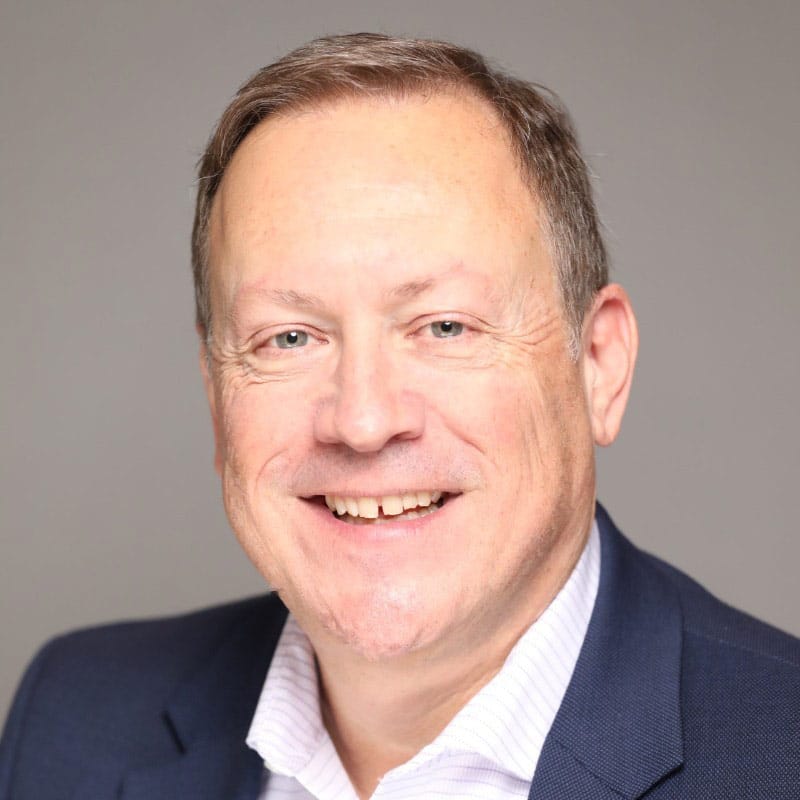
Tony Winckowski is a force to be reckoned with in the sales world. With a track record of accomplishment in managing teams of various sizes and quotas up to $15 million, he has proven time and time again that he is an energetic and strategic leader. Tony’s approach to sales is multi-pronged, utilizing a combination of marketing, inside sales, SDRs, field sales, and enterprise/strategic accounts. He is unique in his ability to recognize and value his operational partners, building long-term relationships through proactive communication, recognition, and respect to achieve mutually beneficial sales victories.
Tony has extensive experience in enterprise sales, industry sales, channel sales, business development, product management, partner development, partner management, and partner enablement, as well as a keen understanding of SaaS and service-based businesses. He is a sales leader who is dedicated to helping his team exceed their quotas and reach personal bests, while always staying at the top of the rankings. Tony Winckowski is truly a sales professional, and one who sets the standard for others to follow.
